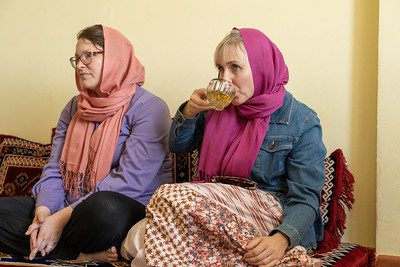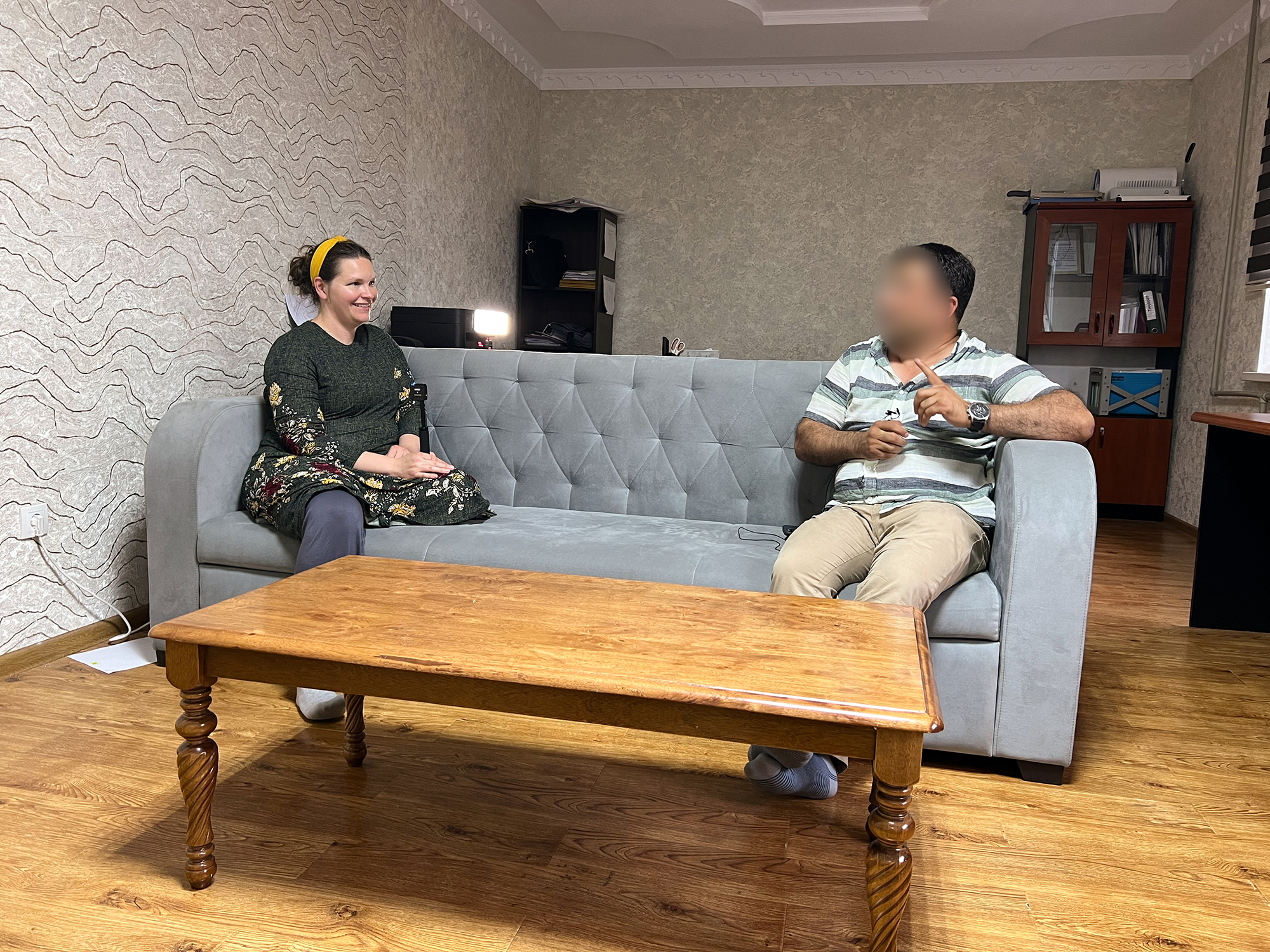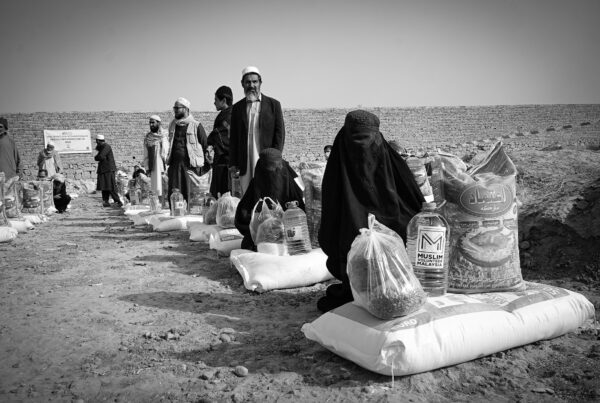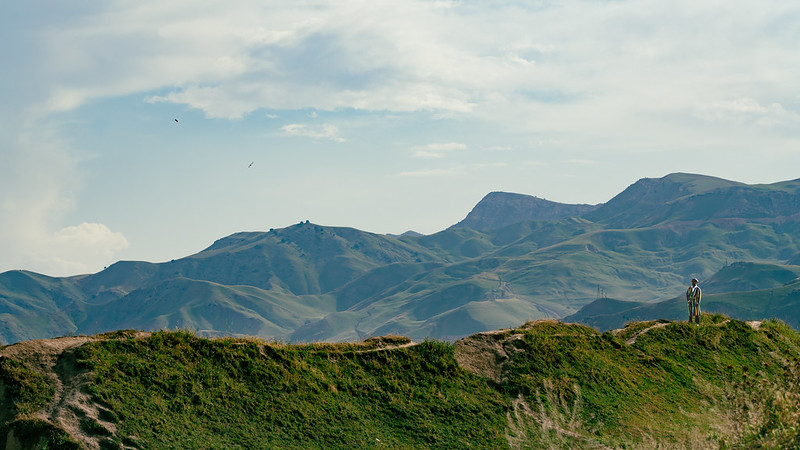by Carla Williams
We arrived in a country near Afghanistan after 28 long hours of travel, including two hours sitting on the runway without air conditioning in Houston. We were hot, overwhelmed, and exhausted. With the sun rising over the mountains, we found sleep in our new rooms at just 5:00 am. The house where we were staying was massive, with almost everyone enjoying a private room and bath. It faced a beautiful courtyard, shaded by grape vines. A fountain filled the air with the music of gently trickling water.
By 8:00 am, I was somewhat awake and ready to begin the day. I had breakfast and sat in the courtyard while we waited for others to pull their exhausted bodies out of bed. Almost every morning brought me to that courtyard by 6:00 am, where I would pray, listen, and wait for whatever that day would bring us.
The first day, we were going to the camps.
First, we had lunch. During our time there, we’d eat Turkish, Iranian, pizza, and local meat a thousand different ways. Only one time was I offered Afghan food, which I mostly had to decline because an American vegetarian cannot possibly appreciate the complexity of perfectly seasoned, delicately spiced, artistically paired cuts of lamb and beef. Meals were an ordeal there, with dinners often lasting more than two hours. There was a mixture of generosity and presentation, where the local team was eager to show us their very best while we, aware of the scarcity, resisted the tendency to squirm at the extravagance.
The Camps
 After lunch, we made our way to the camps, where Afghan refugees live in old apartment buildings. We met at Ali’s restaurant, where he serves traditional Afghan food to the makeshift community. Ali left Afghanistan when the T*liban was ready to kill him for his role in the underground Afghan church. He’s a small man, quiet and wise. His soft-spoken words carrying a weight beyond their gentle reach.
After lunch, we made our way to the camps, where Afghan refugees live in old apartment buildings. We met at Ali’s restaurant, where he serves traditional Afghan food to the makeshift community. Ali left Afghanistan when the T*liban was ready to kill him for his role in the underground Afghan church. He’s a small man, quiet and wise. His soft-spoken words carrying a weight beyond their gentle reach.
From Ali’s restaurant, we divided into groups, each a mix of clueless, jet-lagged Americans and committed Afghan and local men. They were the ones who had built the relationships. They had the presence and the influence in the camps. We were the conspicuous outsiders with hastily wrapped scarves covering our sweat-sticky hair and complicated sandals, not fit for the regular removal at every doorstep.
In the first house, which was really just two rooms in a row, 16 men, women, and children lived on top of one another. They offered us the seat of honor, carrying in trays of tea and cookies. We’d be served some version of this same offering five more times that day. I’d wonder each time if it was the only food they had in the house.
The first family left Afghanistan because the T*liban killed a little boy’s father. A woman had become a believer. Concerned for her safety, her brother helped her leave the country. But because of his betrayal, the T*liban killed him in cold blood, leaving his young son an orphan. Because of this cruelty, the whole family rejected the chains of Islam and became followers of Jesus, the only true source of peace. The T*liban planned to take their 8-year-old daughter as a child bride to punish the family, but instead the mother escaped in the night with the kids. The father requested permission to go retrieve them, but escaped with them instead.
Now they are raising the nephew whose father had been killed. They brought him into the room and put him on display for us – the orphan, whose father did the right thing and died. We tried not to look away.
After that, we went to several more houses. The movie star whose films about women’s rights were not appreciated. (His wife and daughters would join me at trauma training that week). The man who had to meet us in the parking lot because his family did not approve his interest in Jesus. The refugee who had been separated from his wife and children for two years. The single mom who found hope in Christ only a few days before we arrived.
Each family had a different version of the same heartbreaking story. They lost everything. They didn’t know when or if things would get better. The local believers who were walking with them made all the difference.
While we were meeting quietly with families, our teammates delivering food in another area of the camps were having a very different experience. Refugee families began to realize they were distributing food and supplies, and desperate groups were gathering around them—begging for food, for amnesty, for relief, for passage into another country. As the air became charged with urgency and panic, the team pulled out early, leaving hopelessness in their wake. There are problems a trunk full of vegetable oil and dry rice cannot fix.
Later that week, I’d return to the camps with our video team at the request of the Afghan elders. After serving us huge amounts of exquisite Afghan food from Ali’s restaurant on a man’s bedroom floor, they asked us to make a video telling the West of their most desperate needs – sustainably waged jobs, refugee status in developed countries, schools in the camps where their kids could go. Their requests were urgent and heartbreaking. We couldn’t tell them that our American citizenship didn’t give us the power to change the economy or educational system in a country almost 7,000 miles away.
Trauma Training
Early the next morning, our half of the team arrived at the location where we would be hosting the trauma training. The rest of our team went 10 minutes away to lead local believers in disciple-making training. They would learn to be disciples worth reproducing, prayer walk, share their story and God’s story in as few words as possible, and other key principles necessary for seeing the Gospel spread rapidly to people who have never heard it before.
My team had been planning for months for this training. We were expecting 20 Afghan refugee women, and we had thoroughly prepared ourselves for every situation. Or so we thought. As men began trickling in, we experienced a quick moment of panic. Why were they there? Would white women even be allowed to teach them? Would this prevent any female participants from feeling safe to share? We gathered in a huddle, considering our options and alternatives.
Knowing that we’d been praying for months and months, we decided to trust that God was going to do what He was going to do. We committed to being flexible, united, and creative and put the rest in God’s hands. We divided the participants into two men’s small groups and two women’s groups. The men were in the back and the women on the floor in the front. We had just enough translators. We prayed for the best.
Even the first day, it was clear that God was at work. No one seemed the least bit concerned that the training included both men and women. Everyone settled into easy camaraderie, despite the combination of at least four languages provided by 35 people who were American, Afghan, Tajik, Uzbek, Iranian, and even a couple from New Zealand! We had professional counselors, local believers, and heart-weary refugees.
As we began learning about trauma and its effects on the brain, the wonder in the room was tangible. For many people, even the professionals, the idea that trauma could cause long-term physical, emotional, and spiritual damage was completely unexpected. Within hours, participants began thanking us as tears flowed freely. We were told dozens of times that God was answering the deepest prayers of their hearts. Healing was possible. Hope was on the horizon.
For the next four days, we heard countless stories of trauma, healing, and possibility. Bonds formed instantly as each group settled into a vulnerable collection of shared trust. They learned how to calm strong emotions, how to walk through grief without taking dead-end shortcuts, how to process their own stories, and how to lament their prayers to God.
Some people found hope in realizing that their grief and reactions were normal in light of their trauma. Some found purpose in walking through hard conversations with people they loved. Some found freedom in openly acknowledging their struggles and shame.
 One day, we talked about knowing our own feelings. We each drew a heart, with a key along the side with our most common feelings. Then we colored our heart however we felt best expressed the feelings we carry. I sat next to sweet Munira, who asked me what I see when I look at her heart. I pointed out that her hope and joy seemed most prominent. “You don’t see the fear?” She asked tentatively. I looked again.
One day, we talked about knowing our own feelings. We each drew a heart, with a key along the side with our most common feelings. Then we colored our heart however we felt best expressed the feelings we carry. I sat next to sweet Munira, who asked me what I see when I look at her heart. I pointed out that her hope and joy seemed most prominent. “You don’t see the fear?” She asked tentatively. I looked again.
“Yes, I guess I see it if I look closely.”
“Oh, but Carla, fear is the background of my whole heart!” I asked her why she was afraid, and she admitted she’d always been afraid of everything. That it shapes how she sees the whole world. I told her that when I looked at her heart, I could see glimpses of that fear, but that her joy and her peace were stronger. Fear might be the background, but it wasn’t the whole story.
With her cheeks wet with her tears, she kept whispering, “Wow. Oh, wow.” Finally, she wondered if all that fear wasn’t going away, but was becoming part of how she’d connect with hurting people — if maybe God would use those hard things to give her compassion and comfort as she loved others. “You all have made me realize that trauma can be my friend.” The tears kept falling.
She would later tell us that the training had directly clarified her purpose. After being alive for more than 40 years, she finally knew what she should do with her life: God had created her to walk through hard things with other people. To bring healing, connection, and hope to the hurting.
There were many more stories.
One Afghan refugee and her daughter came to the training feeling completely alone. They didn’t have community or trusted relationships. By the end, they were celebrating new friendships and ideas for connecting with more refugees.
One woman arrived looking so desperately sad that I wondered if she had been dragged there against her will. Her smile at the end of the week will stay with me forever.
An Afghan man had been imprisoned for 8 years because of his honest writings, and he shared a poem and lament with the group that brought many people to tears.
Before we’d even finished, several people had already formed new groups to practice and multiply the training in their own circles.
One woman shared her intensely painful story one-on-one for the first time in her life. She left feeling like a weight had been lifted from her shoulders.
Many people experienced growth in their own ability to calm their emotions, sleep peacefully, and relieve muscle tension just by applying the simple strategies they learned that week!
The week was an absolute gift – a priceless experience for us as we were given the honor of walking through a difficult topic with men and women who had strong faith, despite endless hardship. It was a gift to serve with my team, who loved and listened and wept and waited so patiently and compassionately. It was also a gift for those God brought to us – women and men who found freedom, truth, peace, and wisdom as they moved forward in their lives.
Interviews
In addition to my role leading one of the women’s small groups at the trauma training, I was also there to capture stories with our video team. On two days, this meant going directly from the trauma training to wherever we were doing interviews that evening. It’s an adjustment— mentally and emotionally—to go from sitting with women in a big pile on the floor as we walk through trauma and healing to moving into a position of assumed authority with men. And then we added cultural expectations, three languages and a translator, jetlag, and technical considerations for a fully complex adjustment.
 Despite the jarring shift between the roles, it was a treat to watch our video guys move with impressive flexibility, patience, and artistry. I mostly tried to just compliment what they were so expertly capturing. It was amazing to see how God brought together so many gifts, experiences, and personalities and then united them for His glory.
Despite the jarring shift between the roles, it was a treat to watch our video guys move with impressive flexibility, patience, and artistry. I mostly tried to just compliment what they were so expertly capturing. It was amazing to see how God brought together so many gifts, experiences, and personalities and then united them for His glory.
Not to say it wasn’t its own adventure. In one interview, a previous “weird feeling” led to the confirmation of an extramarital affair between a local leader and a new believer. One interview ended up being with a totally different person than we’d originally been prepped for. In one interview, we were told in no uncertain terms that we were not to bring up faith-related topics, even though the video was with the leaders of the local church. And after one interview, the person we videoed asked my friend if they could swap hats, effectively snatching his SPF 50, moisture-wicking masterpiece for a sweat-stained camo cap.
Even though it was complicated to carry both roles, it was also an honor. In both situations, I had a front-row seat to convicting stories about loss, grief, and God’s unending faithfulness. It was powerful to hear about the brothers and sisters whose stories are so difficult, but whose faith is strong and full of joy.
In many ways, this trip was about the impact of our stories. In our stories, we find restoration. We consider God’s faithfulness. We learn to listen, to ask questions, to hope. Our stories help others realize that they are not alone. Our stories provide insight, they shape our understanding, and they shift our perspective.
The stories from this trip will help us lament, they help us remember, they help us heal.
There is still a huge need for the refugees and displaced people of Afghanistan. The need there is ongoing, urgent, and heat-breaking. But it’s a true gift to walk alongside the Afghan men, women, and children who need healing and hope. They are hurting emotionally, physically, and spiritually, but the Church is ready to respond. Learn more about how you can get involved at TeamExpansion.org/Afghanistan.






